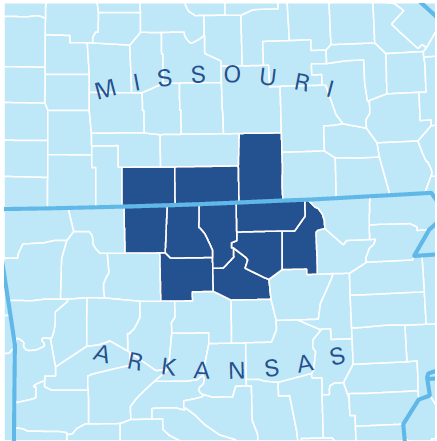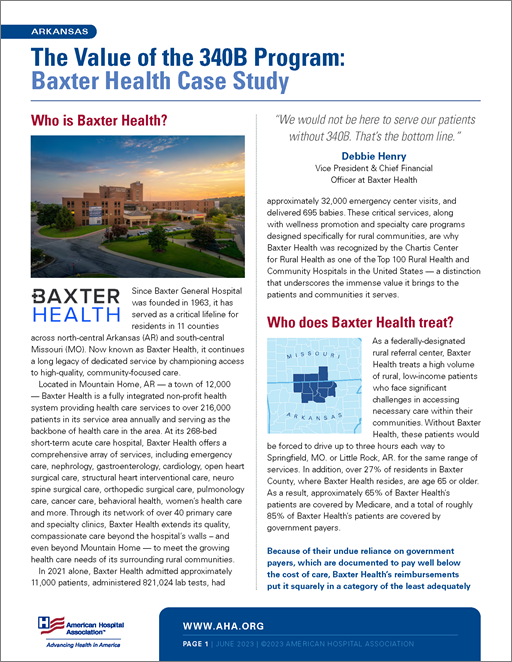

Baxter Health | Arkansas
The Value of the 340B Program Case Study
Who is Baxter Health?

 Since Baxter General Hospital was founded in 1963, it has served as a critical lifeline for residents in 11 counties across north-central Arkansas (AR) and south-central Missouri (MO). Now known as Baxter Health, it continues a long legacy of dedicated service by championing access to high-quality, community-focused care.
Since Baxter General Hospital was founded in 1963, it has served as a critical lifeline for residents in 11 counties across north-central Arkansas (AR) and south-central Missouri (MO). Now known as Baxter Health, it continues a long legacy of dedicated service by championing access to high-quality, community-focused care.
Located in Mountain Home, AR — a town of 12,000 — Baxter Health is a fully integrated non-profit health system providing health care services to over 216,000 patients in its service area annually and serving as the backbone of health care in the area. At its 268-bed short-term acute care hospital, Baxter Health offers a comprehensive array of services, including emergency care, nephrology, gastroenterology, cardiology, open heart surgical care, structural heart interventional care, neuro spine surgical care, orthopedic surgical care, pulmonology care, cancer care, behavioral health, women’s health care and more. Through its network of over 40 primary care and specialty clinics, Baxter Health extends its quality, compassionate care beyond the hospital’s walls – and even beyond Mountain Home — to meet the growing health care needs of its surrounding rural communities. In 2021 alone, Baxter Health admitted approximately 11,000 patients, administered 821,024 lab tests, had approximately 32,000 emergency center visits, and delivered 695 babies. These critical services, along with wellness promotion and specialty care programs designed specifically for rural communities, are why Baxter Health was recognized by the Chartis Center for Rural Health as one of the Top 100 Rural Health and Community Hospitals in the United States — a distinction that underscores the immense value it brings to the patients and communities it serves.
“We would not be here to serve our patients
without 340B. That’s the bottom line.”Debbie Henry
Vice President & Chief Financial
Officer at Baxter Health
Who does Baxter Health treat?
 As a federally-designated rural referral center, Baxter Health treats a high volume of rural, low-income patients who face significant challenges in accessing necessary care within their communities. Without Baxter Health, these patients would be forced to drive up to three hours each way to Springfield, MO. or Little Rock, AR. for the same range of services. In addition, over 27% of residents in Baxter County, where Baxter Health resides, are age 65 or older. As a result, approximately 65% of Baxter Health’s patients are covered by Medicare, and a total of roughly 85% of Baxter Health’s patients are covered by government payers.
As a federally-designated rural referral center, Baxter Health treats a high volume of rural, low-income patients who face significant challenges in accessing necessary care within their communities. Without Baxter Health, these patients would be forced to drive up to three hours each way to Springfield, MO. or Little Rock, AR. for the same range of services. In addition, over 27% of residents in Baxter County, where Baxter Health resides, are age 65 or older. As a result, approximately 65% of Baxter Health’s patients are covered by Medicare, and a total of roughly 85% of Baxter Health’s patients are covered by government payers.
Because of their undue reliance on government payers, which are documented to pay well below the cost of care, Baxter Health’s reimbursements put it squarely in a category of the least adequately reimbursed hospitals in both Arkansas and in the U.S. These low reimbursement rates have placed a significant financial burden on Baxter Health, particularly given that reimbursements have not kept pace with record inflation and skyrocketing costs for workforce, drugs and medical supplies over the last few years.
What’s the value of the 340B Program for Baxter Health and its patients?
The 340B program has been instrumental in helping Baxter Health fulfill its mission to provide high-quality care to the rural communities it serves. Specifically, Baxter Health has used 340B savings to design and implement programs to, among other things: Expand Disease Awareness and Management Programs. The 340B program has allowed Baxter Health to expand many of its disease support programs to include physician oversight and guidance on how to manage various conditions. For example, Baxter Health opened a diabetes clinic that not only supports education efforts but also allows patients to work directly with a clinical team to better manage their treatment plan. As a result of the program, patients have been able to better manage their diabetes and have improved access to diabetic medications, resulting in improved health outcomes overall.
Attract and Retain High-Quality Staff. 340B savings have helped Baxter Health bring additional providers to the community for specialized care to address community needs. For example, Baxter Health was able to hire an infectious disease physician specialist to care for a growing patient population with Hepatitis C, patients who otherwise may not have received the necessary specialized care. In addition, Baxter Health was able to retain gastroenterologists and oncologists in the community who were planning to leave Baxter County due to financial challenges, as well as hire additional staff to meet increasing patient demand. With these specialty providers on staff, Baxter Health has been better able to ensure patient access to these services in the local community and improve overall patient outcomes.
340B Hospitals Need Support
The 340B Drug Pricing Program enables Baxter Health to remain an independent and community-focused organization meeting its mission. Baxter Health uses the savings from the 340B program to not only provide its patients with medications for free or at a steep discount but also a comprehensive array of high-quality primary and specialty care services to meet the unique needs of its rural patient population.
Yet, even with this critical program, Baxter Health continues to face several challenges as a rural provider. Last year, Baxter Health suffered a $4.8 million operating loss, which would have been even worse had it not been able to realize $4.0 million in savings through the 340B program. Operating at a financial loss of this magnitude is hard for any institution, let alone a rural hospital whose community depends on its existence for access to health care.
Furthermore, Arkansas law prohibits non-profit hospitals from owning retail pharmacies, meaning that Baxter Health is reliant on a network of community and specialty pharmacies it has contracted with to fill prescriptions for patients and retain 340B savings. The recent onerous limitations imposed by the largest drug companies on the ability of hospitals like Baxter Health to contract with local community and specialty pharmacies has made it more and more difficult for Baxter Health to preserve patients’ access to their needed medications and services supported by the hospital’s 340B savings. These and other efforts by drug companies to further scale back the 340B drug pricing program would require Baxter Health to operate at a deeper financial loss and could result in the hospital having to scale back some of its services or being unable to retain and attract needed staff. Ultimately, it’s the patients and communities served by Baxter Health who would suffer. This is the same reality that other hospitals, especially rural hospitals, in Arkansas and across the country are facing.
More than 30 years after it was established, the 340B program continues to be a critical resource for hospitals to stretch federal resources to invest in compassionate, high-quality patient care. Now, the federal government must recommit to the 340B program so that hospitals like Baxter Health can continue to respond to the critical and varied needs of their communities.


